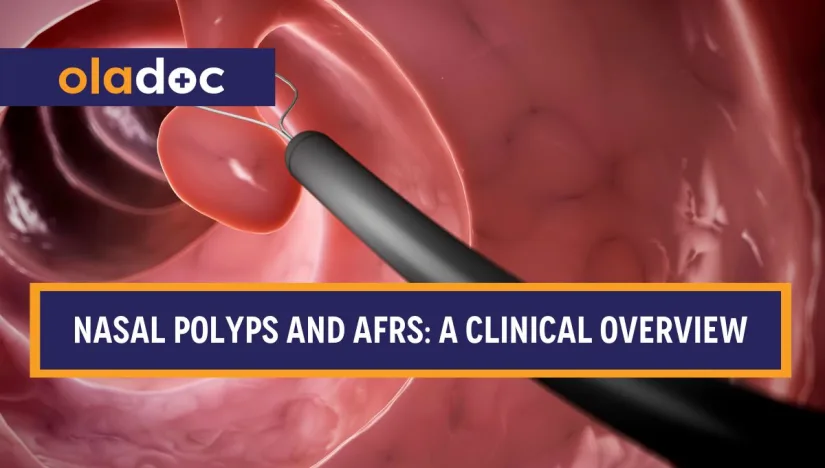Nasal polyps and allergic fungal rhinosinusitis (AFRS) commonly coexist, and are chronic inflammatory conditions that affect the nasal and paranasal sinuses.
These conditions are accompanied by sinus pressure, nasal blockage, repeated infections, and anosmia or loss of smell that substantially affects daily life.
This article will provide a detailed overview of both these conditions.
Table of Contents
Key Takeaways
- Nasal polyps are benign growths that can block the nasal cavity, reduce the sense of smell, and cause sinus problems.
- AFRS is a chronic allergic response to fungi.
- The treatment includes medical therapy (steroids, saline rinses) combined with surgery (FESS) in cases of AFRS to remove fungal debris and polyps.
- For the treatment of these conditions, you can consult an ENT doctor for advice.
Nasal Polyps
Definition
Nasal polyps are soft, painless, and benign growths of the nasal mucosa generally emerging from the ethmoid sinuses.
They are typically associated with the eosinophilic type of chronic rhinosinusitis (CRS). Their development is associated with chronic inflammation, usually characterized by eosinophils, T-helper type 2 (Th2) cytokines (e.g., IL-4, IL-5, IL-13), and high IgE levels.
Chronic inflammation causes oedema, resulting in the formation of polyps.
Aetiology and Risk Factors
- Asthma.
- Chronic rhinosinusitis with or without nasal polyps (CRSwNP/CRSsNP).
- Cystic fibrosis.
- Allergic fungal rhinosinusitis.
- Aspirin-exacerbated respiratory disease (AERD).
Allergic Fungal Rhinosinusitis (AFRS)
Definition
AFRS is a non-invasive type of fungal sinus disease that occurs due to a hypersensitivity reaction with environmental fungi in atopic individuals. It has been classified as a subtype of CRS and recognized as a special type because of the presence of allergic mucin containing fungal hyphae.
AFRS involves type I (IgE-mediated) and type III hypersensitivity reactions. The allergic response results in thick, tenacious allergic mucin accumulation and obstruction of the sinuses, usually resulting in sinus opacification. Nasal polyps are often large, recurrent, and associated with AFRS.
Contributive Fungi: Aspergillus species, Bipolaris, Curvularia, and Alternaria are the commonly implicated fungi.
Symptoms
The symptoms of nasal polyps and AFRS are as follows:
Nasal Polyps
- Postnasal drip.
- Bilateral nasal blockage.
- Nasal discharge.
- Hyposmia.
- Snoring and mouth breathing.
- Facial pressure.
Allergic Fungal Rhinosinusitis (AFRS)
AFRS presents with all the above symptoms of nasal polyps, along with:
- Green or brown, thick nasal secretion.
- History of allergic rhinitis or asthma.
- Facial deformity or proptosis in severe cases.
- Recurrent polyps after surgery.
- Sinus pain and pressure.
Diagnosis of Nasal Polyps and Allergic Fungal Rhinosinusitis (AFRS)
Nasal Polyps
- Nasal endoscopy: Pale, edematous polyps in the nasal cavity.
- CT Scan: Mucosal thickening with sinus opacification, especially in the ethmoid sinuses.
Allergic Fungal Rhinosinusitis (AFRS)
- CT scan: Shows bony remodeling and expansion of the sinus walls.
- MRI: May differentiate allergic mucin from neoplastic lesions.
- Allergy tests: Skin prick or specific IgE tests for fungal allergens.
- Histopathology: Allergic mucin, with eosinophils and Charcot-Leyden crystals, fungal hyphae with special stains.
Treatment
The treatment for nasal polyps and AFRS is explained below:
Nasal Polyps
1. Corticosteroids
Nasal corticosteroid sprays (e.g., fluticasone, mometasone) to reduce inflammation and polyp size.
Oral corticosteroids (short course) in severe or recurrent cases.
2. Saline Irrigation
Regularly use isotonic or hypertonic saline rinses to remove mucus, allergens, and fungal debris.
3. Treatment of Allergies
- Antihistamines for associated allergic rhinitis.
- Leukotriene inhibitors in select cases.
- Allergen immunotherapy is indicated if symptoms are appropriately identified.
Allergic Fungal Rhinosinusitis (AFRS)
Functional Endoscopic Sinus Surgery (FESS)
- In the case of AFRS, thorough clearance is important to reduce recurrence.
- Clearance of nasal polyps, fungal debris, and diseased mucosa.
- Improve ventilation of the sinuses and access for topical medications.
Conclusion
Both nasal polyps and AFRS are chronic conditions with high recurrence rates. AFRS indeed has a more aggressive course with potential for orbital and skull base involvement.
Long-term management of these conditions involves careful follow-up, routine endoscopic cleaning, and long-term compliance with medical therapy to reduce inflammation.
Frequently Asked Questions (FAQs)
Can nasal polyps and AFRS occur even after treatment?
Both conditions can recur but AFRS has a higher recurrence rate. Hence, it is necessary to continue with medical therapy and ENT follow-up visits even after surgery.
Is AFRS contagious?
No, AFRS is not contagious. It is an allergic reaction to fungi in the environment and is not an infection that can spread from person to person.

